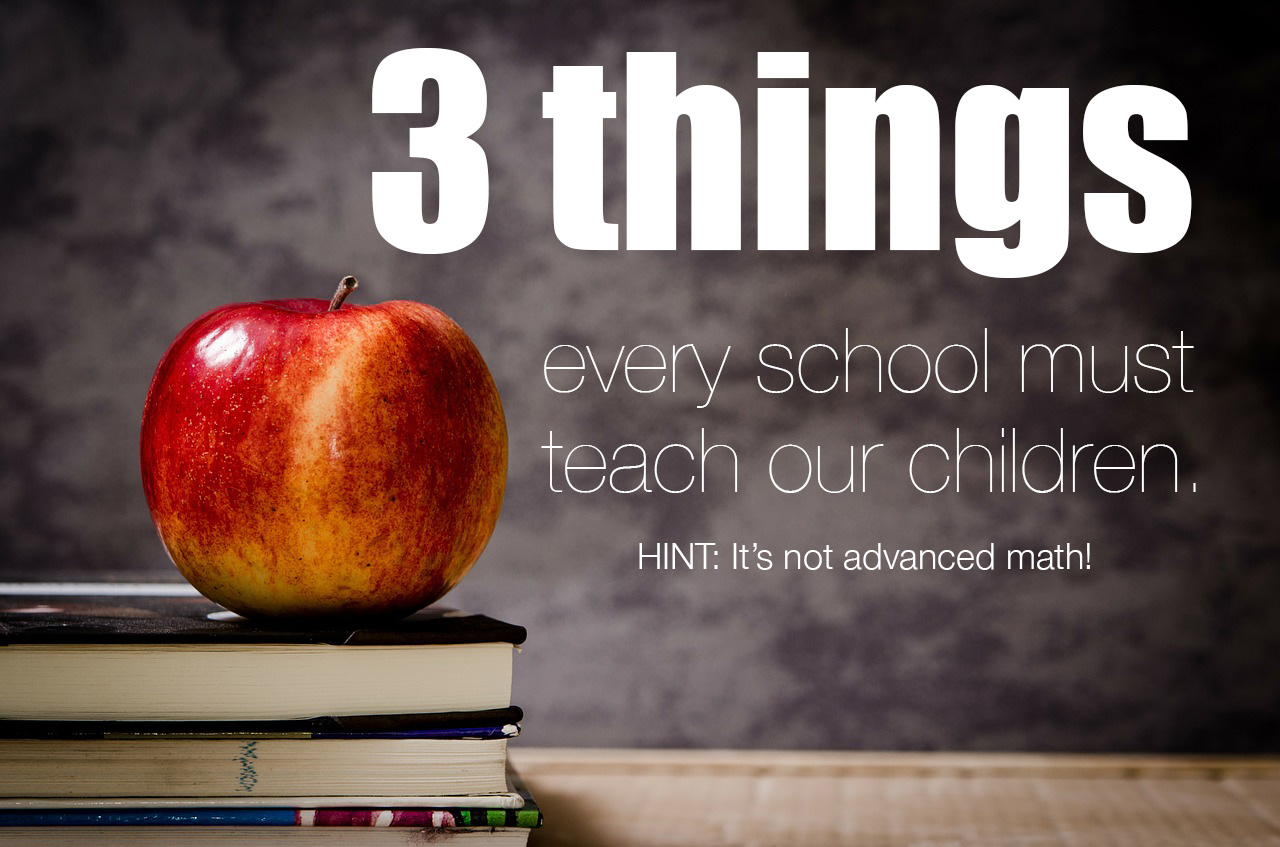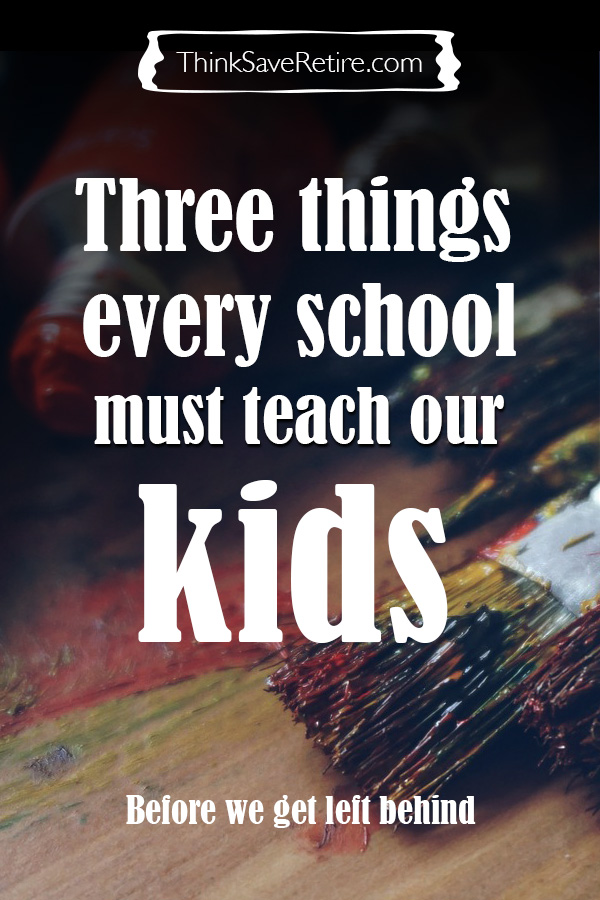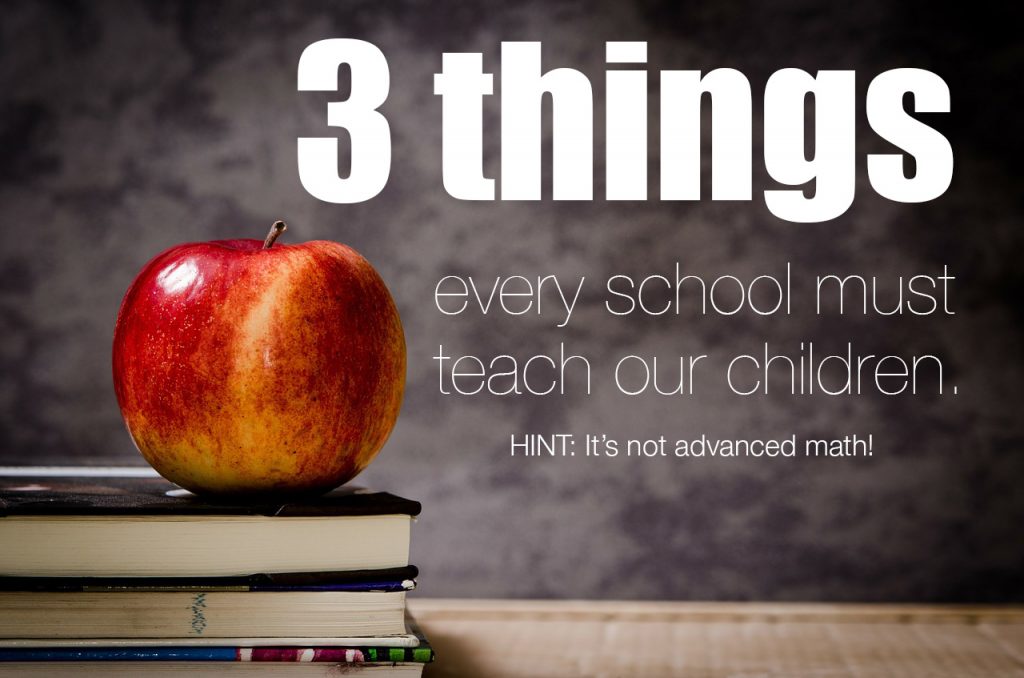The three things every school must teach our kids

I am not a big fan of how most schools are run. Our one-size-fits-all approach to educating our nation's younger population does our entire society a disservice, and we are saddling some truly amazing teachers with the burdens of a broken and incomplete system.

And it all starts at the lowest levels of education. Think grade school.
It's education for the masses. We teach in very standardized ways even if those ways aren't all that effective in disseminating information. Our kids are fed buckets of pre-packaged data built and interpreted by textbook authors and publishers.
By the end of grade school, our kids supposedly know a bunch of line item data sets and then POOF! - as if by magic, they are ready to live as adults.
Why, then, does our nation not lead the world in education? Or even come close?
Is the U.S. falling behind the world?
Don't compare American schools with the rest of the world unless you want to witness a bloodbath. An article in The Atlantic calls the U.S. education system "mediocre", citing our relatively modest showing in worldwide math assessments conducted by Programme for International Student Assessment, or PISA.
"The U.S. scores below average in math and ranks 17th among the 34 OECD countries. It scores close to the OECD average in science and reading and ranks 21st in science and 17th in reading."

I'm sorry, but what the hell?
We are supposed to be the most civilized, well-educated and powerful nation in the world, but our education system produces results that are...middle of the road, at best?
"On average, 13 percent of students scored at the highest or second highest level on the PISA test, making them “top performers.” Fifty-five percent of students in Shanghai-China were considered top performers, while only nine percent of American students were."
Worse, Education Week reports "While 80 percent of high school seniors receive a diploma, less than half of those are able to proficiently read or complete math problems."
Greeeaaat.
What does all this truly mean? What happens when our youngsters can barely "solve for X", and certainly don't understand compound interest? Debt.
An incredibly high percentage of Americans are in debt - this study suggests 80%. On average, Americans carry with them $130,000 in total debt, more than $15,000 of that in high-interest credit cards. Sadly, household debt among Americans has increased 15% faster than incomes over the past 12 years. A third of people have nothing saved for retirement. Zip. Zilch. Debt is killing our nation's future generations.
It is evident that our educational system does not come close - or even attempt, to fundamentally teach our younger generation about money. While there should be an element of parenting involved in this process as well, grade school is supposed to install a certain base level of knowledge within kids - enough to basically stumble around society with at least some direction. But basic money management need not apply?
How depressing. But, there is a solution.

Three things every school must teach our kids
While it's probably wonderful that I can still robotically recite several lines to Shakespeare's Othello that I was forced to read in high school (twice, in fact!), perhaps a better understanding of, I don't know, debt, compound interest, and budgeting could have made a more meaningful impact in my life.
The truth is that the great majority of life skills I flat out learned on my own.
And that's fucked up because many of us don't get to learn those life skills quite as easily as others. Not everyone enjoyed an upbringing like mine.
I didn't learn a damn thing about personal finance or budgeting in school. I was taught to unquestionably follow directions, fill out worksheets, memorize useless facts and solve insanely complex mathematical equations using page-long formulas.
Contrary to what I was told as a child, my education was neither "well-rounded" nor particularly impactful in my life. If statistics are any guide, I am probably not alone in that realization, either.
Excuse me, but we can do better than this. Schools are supposed to prepare our kids for life in the real world. Here is how we make our education system truly well-rounded:
Our schools need to begin teaching:
- Basic personal finance
Seriously, enough with advanced placement calculus in high school.
Staying out of debt and building a seriously promising future for ourselves doesn't require knowledge in complicated mathematical equations, formulas and rules. It requires a basic understanding of balancing a budget sheet, compound interest, and our credit system.
For Pete's sake, let's not overcomplicate life.
How come I didn't know what a Roth IRA retirement account was until I was in my early 20s? Ask any high school graduate to define "pre-tax income" or "index fund" and you'll get a blank stare. This is a serious problem.
How are we expected to jump out of the gate on a solid footing from high school if our education system refuses to teach basic money management?
Schools need to teach our kids:
- How to balance a budget sheet
- The power of compound interest
- How expenses affect income and vise-versa
- How credit cards, interest rates, and retirement accounts work
- How the stock market works (including mutual, index and money market funds)
Show me a high school kid who can accurately describe the difference between a CD and a Savings account and I'll be one impressed personal finance blogger. I'll also put money on that kid retiring early with a net worth that will make mine look like chump change (btw, here's the difference).
- Logic, Reasoning and How To Think
Learning how to think is different than learning what to think. Our minds naturally want to take the easy route to form standardized conclusions based largely on very little evidence or supporting information.
For example: "I owned a Ford that broke down after 2 years. Ford is an American car. Therefore, all American cars suck and will break down after a couple years".
Of course, this is categorically false, and my experience with driving American cars over the course of my life is a testament to that fact.
Or, "I am a member of X political party. Candidate A is also a member of X political party, therefore, I must vote for Candidate A because he/she is a member of my party".
Our minds naturally want to make things simple, and our blind and unquestionable adherence to rules and procedure during our grade school days helped to plant that seed in all of our brains. We weren't taught to think and analyze. We were taught to follow and accept.
Naturally, structure is necessary - otherwise, we're left with an uncontrollable, chaotic mess. Oh, wait...maybe we already have that!
Schools don't teach logic. In many ways, they are teaching our kids what to think rather than how to think. They teach us to memorize. This leaves us unprepared and ill-equipped to make truly informed decisions that are in the best interest of our lives. Life doesn't give us a bunch of worksheets to complete, after all...only a bunch of tax forms and mortgage documents.
Schools need to teach our kids:
- How to collect data first and decide second
- Reject logical fallacies (ie: the Ford example above)
- Problem-solve by using data and evidence rather than emotion
- Not to be robots; structure does not take the place of the power of our minds
- Question - but not a complete avoidance of, reality
Pardon my conspiracy theory mind for a minute, but the sad reality is that it's not in the best interest of our nation (read: government) to teach our kids to question. A population that questions (authority, conventional wisdom, etc) is a population ripe for uproar and rebellion. It's the opposite of calm, content and, I hate to say it, controlled. It makes the political process of running our government easy and relatively secure.
This hurts our ability to think for ourselves.
The reality of our world is something that cannot possibly be "taught" because everyone's reality truly is different. But, our schools should introduce the plainly evident fact that our reality is not necessarily the reality of our neighbor.
We all don't come from the same backgrounds. Our experience with car manufacturer X does not necessarily correspond with someone else's. Our needs are probably not representative of the needs of the larger country.
You may think that everybody at the office either loves or hates you, but that may not be the case. You might think your dog loves to chew on ropes, but it may just be that he likes to chew (the rope is only the tool to achieve the goal).
You may believe that you spend extra time at work because you love your job, but you may be avoiding family problems at home. Though things may seem apparent and easy to figure out, often, things are more complicated than that.
Question what you think you know. Use evidence to confirm your biases. Take nothing at face value.
Schools need to teach our kids:
- Things aren't always as they seem
- Skepticism over conventional wisdom is healthy
- Routinely confirm your understanding of reality with evidence
- Education doesn't stop after high school or college; keep learning
In the end, our future is only as bright as the people who lead it. Our kids today will eventually lead our nation tomorrow, and churning our youth through a mediocre education system does not bode well for any of us. Let's not fuck this up. The fact is taking classes like advanced placement calculus is not nearly as useful as learning basic money management or truly observing our world around us with a calm and objective eye.
Memorizing a bunch of facts does not equip us to excel in this world.
What say you? Are there other topics that you believe should be taught in grade school? Were you ever taught about budgeting or personal finance?
This post was originally published June 2016 but has been updated and revised using the Revise and Republish strategy.